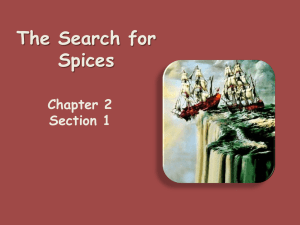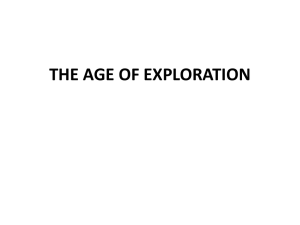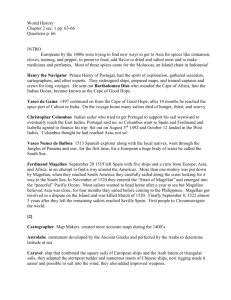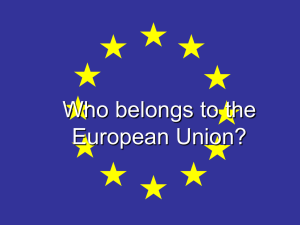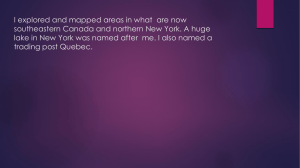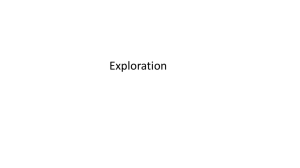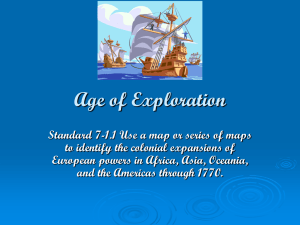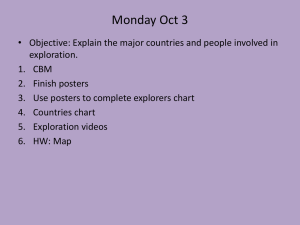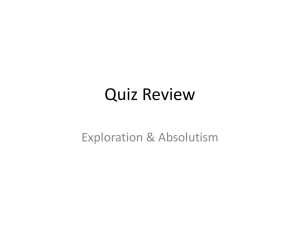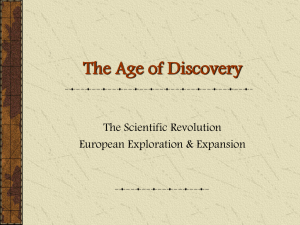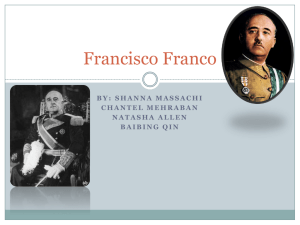AGE OF EXPLORATION (1450-1750)
advertisement
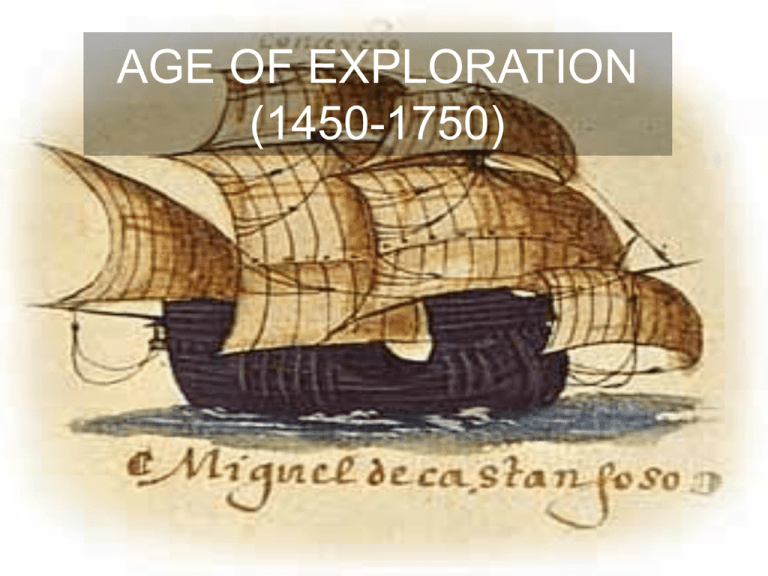
AGE OF EXPLORATION (1450-1750) Exploration (1450-1750) • 1271-1275: during Middle Ages, Marco Polo tells Europeans about China (people become interested about Far East) • Italy (Genoa/Venice) dominates trade with Asia for spices. • Other countries either break monopoly or find other route to the Far East. Innovations • Compass • Astrolabe (perfected by Muslims) used to determine a ships latitude • 1400’s European ships worse than Chinese, Arab, Indian ships • 1600’s European ships best in world • Ships with triangular sails could sail with or against the wind Portugal • 1415 began exploring west coast of Africa • 1439 Portuguese concerned that if Turks control Constantinople they would cut of trade of charge higher prices for trading • 1441 discover Africa’s Gold Coast Portugal • Prince Henry the Navigator built navigation school and financed voyages Reasons: 1) win new lands for Christianity 2) acquire share of African slave trade, gold trade 3) gain trade with China and India for spices Portugal • Problems with Exploring further south – Sailed using north star which you can’t see when you travel south of the equator • Solution: – Toscanelli created a map of the world using grid lines but was inaccurate because Marco Polo exaggerated the size on Eurasia. This made the route west across the ocean look shorter than it actually was. – Toscanelli gave his maps to a captain in 1483 who proposed to sail west but was rejected by the officials in Portugal. He was financed to sail his proposed route by Spain. • His name: Christopher Columbus!!!!!!!!!!!!!!!!!!!!!!!!!!!!!!!!!!!! Portugal (Explorers) • 1487: Bartholomeu Dias sailed around tip of Africa • 1498: Vasco Da Gama sailed around Africa into the Indian Ocean to India and brought back spices to Portugal. • This event causes trade with Italy and the Mediterranean sea to decline. Spain • Columbus thought route west was shorter than it was and he could reach China by sailing west • 1492 landed on island in Caribbean Sea • Columbus died believing he found Asia • 1497-1503: Amerigo Vespucci make voyages west and describes new world • German mapmaker drew up new map after reading Vespucci’s info and name new area “America” Portuguese Empire • 1st country to develop overseas empire • West coast Africa • East coast Africa • Southwest coast • India • Island in Indonesia • Ports in Japan and China Portuguese Empire (Decline) • Government not strong or well organized • Every year sent strongest young men out as sailors and traders • Intolerant views towards non-christians in their colonies (effect of Reconquista) • 1580: Spain added Portugal to its land but did not help support the colonies they had created Spanish Empire • West Indies • Mexico (Cortez conquers Aztecs for their gold using horses and guns) • Peru (Pizarro conquers Incas for their silver and gold) • Florida (De Soto) • Central North America (Coronado) • Established settlements in New World Spanish Empire (Decline) • Other countries attacked Spanish ships returning form the New World with riches (This caused a war between Spain and England which Spain lost.) • Spanish nobles thought work was degrading (no innovations) • Muslim Moors and Jews were driven out • Spain had to send its riches to other countries who produced the good they needed. England • 1588: Phillip II of Spain used his Spanish Armada to attack England because they were attacking Spanish ships carrying riches • 1600’s founded colonies along east coast of North America Dutch (Netherlands) • 1602: Dutch East India Trading Company created to trade with Africa and the West Indies • 1626: bought Manhattan Island in New York from Indians for $24. French • 1535-1536: Cartier sails up the St. Lawrence River and claims most of eastern Canada, Great Lakes region, and inland along Mississippi River. Russia • North Western coast of North America Effects of Exploration • Increased use of money • Banking: deposits, credit, loans • Medici family in Florence gains wealth through banking • Growth of capitalism where individual people make decisions based on supply and demand

